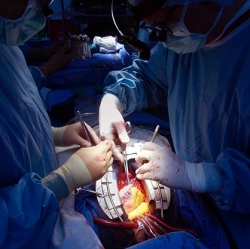
The unique method developed by Professor Michel Meunier and his team uses a femtosecond laser (a laser with ultra-short pulses) along with gold nanoparticles. Deposited on the cells, these nanoparticles concentrate the laser’s energy and make it possible to perform nanometric-scale surgery in an extremely precise and non-invasive fashion. The technique allows to change the expression of genes in the cancer cells and could be used to slow their migration and prevent the formation of metastases.
The technique perfected by Professor Meunier and his colleagues is a promising alternative to conventional cellular transfection methods, such as lipofection. The experiment, carried out in Montréal laboratories on malignant human melanoma cells, demonstrated 70% optoporation effectiveness, as well as a transfection performance three times higher than lipofection treatment. In addition, unlike conventional treatment, which destroys the physical integrity of the cells, the new method assures cellular viability, with a toxicity of less than 1%. The study’s results were published in the prestigious journal Biomaterials.
This major scientific breakthrough could lead to the development of promising applications, including new therapeutic approaches in oncology, neurology and cardiology.
